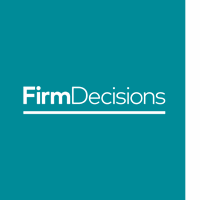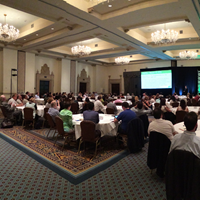Transparency dominates debate at ANA conference
For most of last week, leading figures in global advertising procurement – from advertisers, agencies, and specialist consultancies – gathered for the annual Advertising Financial Management conference run by the U.S. Association of National Advertisers (ANA).
In his opening address, ANA CEO Bob Liodice made it clear that this year’s event in Hollywood, Florida, boasted the largest number of delegates yet. This reflects ever-increasing interest from advertisers who are looking for increased transparency from their media agencies and particularly in the digital media supply chain.
The four major themes debated at the conference were agency compensation models, programmatic media trading, data privacy, and accountability. Across each of these themes, transparency was a dominant motif. And in each area, our consultants have a clear role to play.
Agency compensation models
The debate about agency compensation focused on media benefits, with emphasis on why advertisers still appear not to be receiving their fair share. Delegates gave evidence that, across all media, media benefit percentages going to agencies are increasing. This is especially true for digital media. However, media benefits are typically repositioned as some other form of transaction such as research or are hidden from advertisers.
Presenters explained how advertisers can close the media benefit gap in three ways:
- By driving accountability with senior agency leaders
- By paying fair compensation to agencies in return for transparency commitments being written into contracts
- By bringing in the right, industry-expert auditors who know exactly where to look and what to look for
Delegates also reflected that there is currently a very small, inner circle of experts in agencies who know how and where media benefits are flowing and why it’s so important to hold agency leadership to account. On the issue of agency fees, there was an emerging consensus that many advertisers do not know what they are paying for across most agency forms. This includes full-time equivalent retainer models, with agency brands looking to maximise revenue and so ensure that margin expectations are at the holding company level.
It was also agreed that negotiations should focus on the explicit level of service advertisers expect to receive. At the same time, advertisers need to be aware that, by securing what they believe to be a good deal, they run the risk that agencies will make efforts to recoup margin elsewhere.
As experts in the field of agency compensation, who conduct detailed financial compliance audits, FirmDecisions verifies agency revenue – including retainers, commission, and bonus structures – against contract terms. We also scrutinize all media benefits that can include rebates, free space, discounts and other benefits against the terms of the contract. We do this to ensure that what is contractually due back to advertisers is returned correctly and in a timely manner.
Programmatic
Programmatic media trading, related costs, and fees were discussed in depth, including the topics of value erosion and the balance between investment allocated to working and non-working media. As programmatic evolves and becomes increasingly sophisticated – as technology costs become more affordable and agency programmatic fees reduce – advertisers are coming to expect that non-working media costs should be decreasing. The reality is often the reverse.
That said, many advertisers appear too willing to accept both non-transparent bundled deals and non-disclosure rights of the non-working media components of their programmatic budgets. Discussion at the conference covered the ways in which agencies find new ways to receive non-disclosed revenue, and yet claim they are 100% transparent with the next breath. Programmatic media trading is a case in point. Yet it was continually reiterated that if advertisers are really concerned about transparency, they should tell their agencies that these non-disclosed deals are not acceptable.
The critical importance of having the right auditors in place was raised many times. This can help advertisers understand the complex programmatic transactional chain.
FirmDecisions’ digital experts often educate advertisers on the importance of securing true transparency in programmatic, which in turn engenders better agency habits and helps to restore trust between agencies and advertisers.
Data privacy
Debate on data privacy showed how even the smallest data breach can have significant consequences and affect the entire business system in which an advertiser operates – such as revocation of a business license or even criminal charges with significant financial penalties. Presenters discussed how some agencies are currently using client data for their own gain without permission, including the misuse of data to target potential clients in their new business approaches.
Expert industry auditors such as FirmDecisions can ensure the right levels of insurance are held at the agency level. In the event of costly law suits over breaches of data privacy, the first port of call will be these insurance contracts. FirmDecisions enables advertisers to understand the potential risks associated with contracts and provides advice on ensuring appropriate levels of insurance cover for both parties.
Accountability
As expected, accountability was a common theme during the conference. This is unsurprising, given that accountability is the key concept for ensuring that transparency is implemented in advertiser/agency relationships. It was generally agreed that stakeholders on both agency and advertiser teams need to be made accountable in setting up their relationship correctly from the outset. This is best done by drafting global Master Services Agreements and by both parties having their roles and responsibilities clearly defined.
Having the right Legal Counsel and auditor in place to assist with global MSA negotiations is crucial for ensuring that accountability is clearly defined. In this way, everyone knows what is expected of them. At FirmDecisions, we often support advertisers throughout the contract period, ensuring adherence to contract terms through compliance checks. In this way, we help ensure that both advertisers and their agencies are compliant with the MSA and any irregularities that arise, which is inevitable as the marketing ecosystem continues to evolve, are covered off to protect the advertiser’s business needs
Accountability was also discussed in wide range of other contexts. Discussion included agency/ advertiser leadership being accountable for their actions on delivering against ROI expectations, while ensuring they act ethically in these leadership roles. The theme was also covered in debate about sponsorship and promotion, one of the fastest-growing areas of spend. Historically, this category of investment was often taken for granted by stakeholders who used it for their own personal benefit, given the difficulty of validating ROI that such spend can bring with it.
In summary
Coming away from the conference, it was clear that a lot of progress has been made by advertisers, their agencies, and their advisers. Many are now putting in place the checks and balances they need to secure the level of transparency they desire. But there was also a strong sense that there’s still a lot to do. This is not least because transparency covers so many aspects of the advertiser/agency relationship, from agency remuneration to programmatic media trading, accountability to data privacy and continues to be the topic of the moment.





